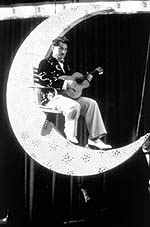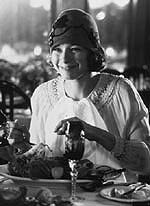Allen and Morton met the press at the Hôtel Bristol on December
17. Woody has been speaking his own bent-but-unbowed version of
French since he made “Everyone Says I Love You,” so the excerpts
below were translated INTO English by yours truly
Q: Your films are appreciated worldwide but in France you’re more
successful than back home. How do you explain this?
WA: For some reason, here I’m a hero and in the US I’m nothing. My
American audience is very small. I don’t understand why. I’m VERY
American. I love jazz and baseball. I was born in Brooklyn. I
make comedies — which are supposed to be untranslatable. But for
some reason, in France, in South America, in Asia, in Israel,
they like me more. Maybe the subtitles are extraordinary.
Q: Is it possible to portray musical genius in a film?
WA: Not really. A genius makes a quantum leap from a merely talented
musician. There are a lot of talented musicians in New York, but
no geniuses.
Q: This is the most Chaplinesque of your films.
WA: My favorite comic film is Chaplin’s “City Lights.” My friends
prefer Buster Keaton, but “City Lights” is my favorite because
of the deep feelings. The girl in that film is just like Samantha.
Q: Wasn’t it frustrating playing a mute in a Woody Allen film, insofar
as Woody’s dialogue is so clever and important?
SM: No, not at all. Even though Hattie doesn’t speak verbally, she’s
constantly speaking in her mind. For me it was refreshing to have
that tool taken away from me. Characters can lie with their words
— say one thing and mean another. I found it absolutely impossible
to “lie,” which lends Hattie much of her purity. Concentration
WAS hard because I found other people so funny.
Q: When Woody offered you the part, you’d never seen any of his
films. And when he told you to play the part like Harpo Marx,
you’d never seen any Marx Brothers movies.
SM: I’m a completely different generation. I’m not a film connoisseur.
I grew up in Nottingham, where we only had the Odeon, so you could
only see “Ghost Busters” or “Raiders of the Lost Ark.” I didn’t
grow up going to the movies or renting videos. I watched telly.
My mentors are Alan Clarke and Ken Loach. [Loach’s] “Kes” changed
my life and made me want to make movies. When Woody said “Watch
Harpo,” it’s like when someone gives you a great book. It was
an education. Hattie’s just a laundress so I didn’t want to complicate
things by doing too much research.
Q: Woody, weren’t you shocked to learn that Samantha hadn’t seen
any of your films?
WA: My own wife hasn’t seen most of my films. But I’m used to
that because most Americans haven’t seen my films.
Q: How did you make it look like Sean Penn is really playing those
incredible solos?
WA: We hired an excellent guitar teacher and Sean studied and
practiced daily for six or seven months. The teacher went to San
Francisco where Sean lives and even followed Sean to Europe when
he was making another film on location. He can play. Not well
enough to really play in the film, but he’s fingering every note
— I can pan from his face to his hands and it’s all him.
Q: As we enter the next century, how do you view the future of filmmaking?
WA: I think the next century will be a golden age. I think directors
will use the new technologies for storytelling and not just for
special effects.




